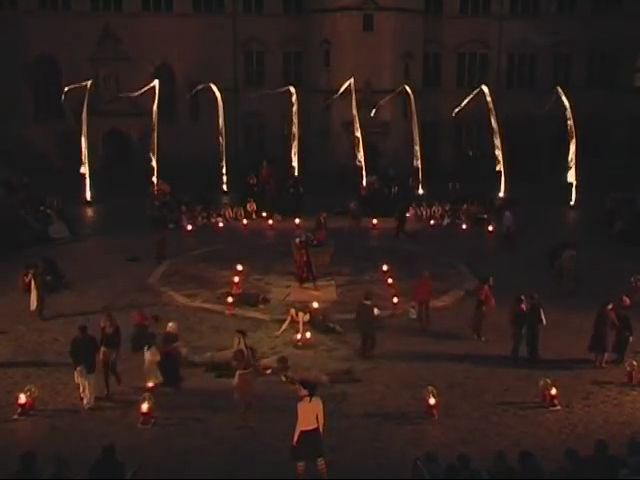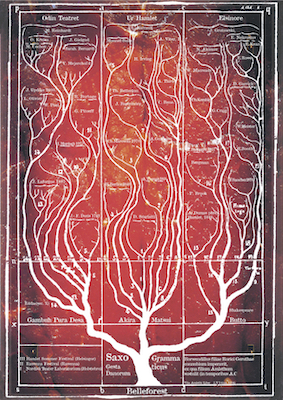About This Clip
Ur-Hamlet
Ur-Hamlet
A brief introduction on Ur-Hamlet by Mirella Schino. Unpublished material kept at Odin Teatret Archives (original source):
Ur-Hamlet is a multicultural project by Odin Teatret: a performance that brings together the Odin Teatret ensemble, a group of actor-dancers from Bali, Japan, Brazil, musicians from different parts of the world, and a long-term pedagogical project for young trainees from all over the world. The project started in 2003 then continued during the ISTA sessions in Sevilla (2004) and Wroclaw (2005), and in the village of Batuan in Bali (2004 and 2006). In 2006 it culminated in a performance which was staged, in slightly different versions in the span of a few weeks, in Ravenna and in the courtyard of the Elsinore castle. A second performance was staged in Wroclaw in 2009, only partially corresponding to the first one.
The project embodies two important faces of the history of Odin Teatret: the research on the Eurasian theatre and on the principles at the basis of the art of the actor irrespective of style or cultural context; and the pedagogical side: the desire and almost necessity to teach these principles also to youngsters who do not intend to work following the style of Odin Teatret. On the stage different styles of theatre and dance coexist and dialogue: the refined Balinese tradition and that of the Orixas, the Western tradition and specifically that of Odin Teatret. Eugenio Barba has chosen to structure them around one [of] the themes dearest to Western theatre: Hamlet – not Shakespeare’s creation but something more ancient, the father of all Hamlets, the story by Saxo Grammaticus.
Barba wrote:
On the stage the audience sees the story of a refined royal court glittering from the gold of the Balinese costumes, in which love, intrigues and death are intertwined while Saxo Grammaticus illustrates their story in Latin. All around them, an entire world of immigrants, neglected, excluded, subterranean people move as rats. They penetrate in silence and lurk in every space left free by the courtiers. But before long this double world in which each group ignores the other is penetrated by plague and contagion.
On Stage: Akira Matsui (Japan), Yalan Lin (Taiwan), Ni Nyoman Tjandri, I Wayan Bawa, Ni Wayan Sudiani and 30 performers and musicians from the Gambuh Desa Batuan Ensemble (Bali): I Ketut Buda Astra, I Ketut Lida, I Ketut Sandi, I Ketut Suwana, I Ketut Karwan, I Made Budiana, I Made Merta, I Made Renanta, I Made Suamba, I Made Suteja, I Made Lesit, I Nyoman Doble, I Nyoman Suwida, I Wayan Bawa, I Wayan Kader, I Wayan Marca, I Wayan Martawan, I Wayan Naka, I Wayan Purnawan, I Wayan Rawa, I Wayan Suamba, Ida Bagus Made Kertayasa, Ni Kadek Ariantini, Ni Luh Anik Windasari, Ni Made Partini, Ni Made Srimpi, Ni Nyoman Juniati, Ni Nyoman Tjandri, Ni Wayan Nugini, Ni Wayan Phia Widari Eka Tana, Ni Wayan Sudiani, Milvia Terenzi, Pino Confessa (Bali), Brigitte Cirla (France), Augusto Omolú and Cleber da Paixão (Brazil), Annada Prasanna Pattanaik (India), Magnus Errboe (Denmark), Odin Teatret (Denmark), and the Foreigners’ Chorus (52 performers from 22 countries): Aeran Jeong (South Korea), Agnieszka Masternak, Agnieszka Sosnowska (Poland), Alberto Martinez Guinaldo (Belgium), Aleksandra Marzec (Poland), Alessandro Curti (Italy), Alvaro Iván Hernández Rodríguez (Colombia), Ana Laura López Morales (Mexico), Andrea De San Juan Hazen (Spain), Antonello Motta (Italy), Bruna Longo (Brazil), Carlos Carmona (Mexico), Carolina Paola Balduzzi (Argentina), Christina Kyriazidi (Greece), Da mian Borowiec (Poland), Dawid Gudel (Poland), Deise Nunes (Brazil), Devrim Evin (Turkey), Dominique Serena Antignano (Italy), Edyta Kutnik (Poland), Ewa Piotrowska (Poland), Felipe Vergara (Colombia), Francesca Guillén (Mexico), Francisco Villicaña Maldonado (Mexico), Giuseppe Leonardo Bonifati (Italy), Isabela Paes (Brazil), Isadora Pei (Italy), Juliana Zancanaro (Brazil), Linda Cunningham (Ireland), Liza Urbanová (Czech Republic), Loren O’Dair (Great Britain), Luciana Martuchelli (Brazil), Magdalena Ptasznik (Poland), Małgorzata Gajdemska (Poland), Marcelo Gomes Miguel (Brazil), Michał Dawidowicz (Poland), Monserrat Montero Cole (Costa Rica), Paweł Leszczyński (Poland), Piotr Filonowicz (Poland), Rachael Lindsay (Ireland), Roberto Aldorasi (Italy), Sofija Ristevska (Macedonia), Soon-Heng Lim (Malaysia), Stefan Adamski (Poland), Stephanos Regueros Savvides (Cyprus), Steve Rice-Khan (Great Britain), Thadd McQuade (USA), Vanna Kårfors (Sweden), Wioletta Farkowska (Poland), Wout van Tongeren (The Netherlands), Yuval Dishon (Switzerland), Zofia Dworakowska (Poland).
Music: Composed and arranged by Frans Winther; classical Balinese and Indian songs
Scenic space: Luca Ruzza
Costumes: Jan de Neergaard and Odin Teatret
Light design: Luca Ruzza and Odin Teatret
Sound: Jørgen Lindholm
Production director: Anne Savage
Production assitant: Luciana Bazzo
Photos: Claudio Coloberti
Poster: Luca Ruzza
Programme: Rina Skeel
Technicians: Fausto Pro, Donald Kitt, Hans Kobberø
English translation: Judy Barba
Director’s assistants: Julia Varley, Ana Woolf, Anna Stigsgaard
Administrative director: Søren Kjems
Literary advisor: Nando Taviani
Dramaturgy and director: Eugenio Barba
Additional Details
2006 Programme
2006 Ensemble
2009 Programme
2009 Ensemble
Press Photos
Odin Teatret Archives | Close-up | Ur-Hamlet
More Videos & Interviews on Odin Teatret’s YouTube Channel
Article
Leonard, Kendra. “History Faux / Real : the 2006 Ur-Hamlet visit.” (2016).
Ur-Hamlet
An interview with Julia Varley on “Ur-Hamlet”
Video by Claudio Coloberti Bali, 2006
Video by Claudio Coloberti
Bali, 2006 less
2006 – Interview with Eugenio Barba on “Ur-Hamlet”
An interview with Eugenio Barba on “Ur-Hamlet”. Video by Claudio Coloberti Batuan, Ubud, Bali, Indonesia, 2006more
An interview with Eugenio Barba on “Ur-Hamlet”.
Video by Claudio Coloberti
Batuan, Ubud, Bali, Indonesia, 2006 less






